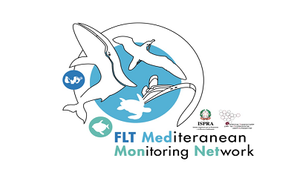Fixed Line Transect Mediterranean monitoring Network - FLT Med Net. The long-term international agreement for the monitoring of marine macrofauna and the main threats deriving from maritime traffic and marine litter has been renewed
ISPRA and fourteen Research Institutions of the Mediterranean Area just signed the new triennial Agreement for continuous standard monitoring of cetaceans, sea turtle, other macro fauna and main threats (FLT Med Net, 2021 – 2024). The Agreement renew a long-term free of charge collaboration which started in 2007, when ISPRA (ex APAT) set off a sustainable approach for gathering long term data on marine macro fauna and two of their main threats (influence of maritime traffic, exposure risk by Floating marine macro litter) using ferries as platform of research. Since then, the approach was developed and shared within a growing international network of Universities and Research Institutions from five Mediterranean countries.
Thanks to the fruitful collaboration of an increasing number of ferry companies that host researchers onboard, the network is now continuously monitoring 16 fixed sampled lines distributed in the Western Mediterranean basin and in the ADRION Region. Two systematic research protocols allowed the consistent monitoring of more than 300'000 km of mostly offshore marine waters during all the seasons recording thousands of cetacean sightings, more than a thousand of sea turtle (mostly Caretta caretta) and many of other marine macro fauna (e.g. sunfish, jellyfish, shark, marine birds). Differences in distribution and seasonal variations for both cetaceans and sea turtles were recorded throughout the years and among the different Mediterranean Marine sub-regions. Data are shared in international databases (e.g. EmodNet, OBIS sea map, French Information System on Nature – SINP, Tursiomed/Intercet platform). The network regularly produces scientific papers on peer reviewed international journals, and tutors several University thesis (Bachelor, Masters and PhD). Among the recent published articles, many investigated species presence and distribution for conservation purposes, habitat use, long-term trends, correlation with environmental features and influence of the main threats of maritime traffic and marine litter (https://www.researchgate.net/project/FLT-Mediterranean-Monitoring-Network-marine-species-and-threats)
Several international projects were developed within the ongoing FLT Med Net collaboration such as ‘Cetacean coordinated monitoring off Tunisia’ ACCOBAMS, ‘Monitoring Ferries’ PELAGOS France, Interreg ‘DeFishGear’, Interreg Med MEDSEALITTER, IMPEL FLT EU. At date, the IMPEL Europe-MTT project aims at further sharing and fine tuning the approach among the Mediterranean, North Sea-Atlantic and Macaronesian EU networks. Since 2018, the MeD4Med project of the University of Milan Bicocca developed a specific protocol for ferry based environmental DNA (eDNA) sampling. The GREEN, MULTIDISCIPLINARY and SYSTEMATIC APPROACH through operating ferries will soon be further implemented and consolidated through the just approved Life CONCEPTU MARIS - CONservation of CEtaceans and Pelagic sea TUrtles in Med Managing Actions for their Recovery In Sustainability (2022-2026) for CEPTU and main threats long-term surveillance and identification of effective mitigation measures. The FLT Med Net scientific partners are ISPRA, Stazione Zoologica di Napoli, University of Pisa DIBIOL, CIMA Research Foundation, University of Torino, University of Palermo DiSTeM, University of Milano Bicocca, University of Barcelona, University of Tuscia, University of Catania, GAIA Research Institute, EcoOcean Institut, Accademia del Leviatano, Associaciòn Nereide, MareCamp. Ferry companies contributing to the project are Corsica-Sardinia Ferry, Grimaldi Lines, Tirrenia CIN, Minoan, CTN, Baleária, Siremar. Date: 1 June 2007 – currently active. https://www.isprambiente.gov.it/en/
Further information on the network

